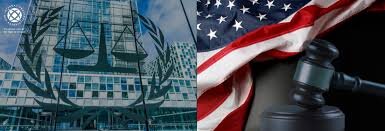Sanctioning judges, silencing victims: The dangerous precedent set by US against ICC

TEHRAN - The Trump administration's recent sanctions against four judges of the International Criminal Court (ICC) marked a historic increase in U.S. opposition to the ICC and raised serious concerns about the future of international accountability and justice.
The sanctions were aimed at judges who were looking into claims that U.S. soldiers committed war crimes in Afghanistan and judges who issued arrest warrants for Israeli officials, including Prime Minister Netanyahu. The sanctions were strongly condemned by the ICC, the European Union, the United Nations, and human rights groups all over the world.
The U.S. sanctions, which were announced on June 5, 2025, prevent the four ICC judges—Solomy Balungi Bossa (Uganda), Luz del Carmen Ibáñez Carranza (Peru), Reine Adelaide Sophie Alapini Gansou (Benin), and Beti Hohler (Slovenia)—from entering the U.S. and freeze any assets or financial interests they have in U.S. jurisdiction. Secretary of State Marco Rubio defended the sanctions by saying that the judges were doing "illegitimate and baseless" things that hurt the U.S. and Israel without their permission.
He framed the ICC as politically motivated and overstepping its authority. This move follows a pattern of hostility from the Trump administration toward the ICC, including previous sanctions on the court's prosecutor over investigations into U.S. military conduct in Afghanistan.
The ICC swiftly condemned the sanctions, stating they were an obvious attempt to undermine the independence of an organization founded by 125 countries to achieve accountability for victims of serious crimes like genocide and war crimes.
They observed that targeting judges and officials performing this duty gave more uncommon power to wrongdoers and prejudiced the victims who are seeking justice. The ICC emphasized the sanctions could undermine the rule of law and global peace, which has impeded the work of the court as we laid out in the Rome Statute.
Most of the world has supported the ICC. The European Union, which includes the nationality of one of the judges who was punished, said that the U.S. action was an attack on judicial independence and called for the ICC's integrity to be protected. Ursula von der Leyen, President of the European Commission, said that the court is very important for holding criminals accountable and giving victims a voice.
Volker Turk, the UN's human rights chief, told the U.S. to lift the sanctions. He said that punishing judges for doing their jobs goes against the basic principles of the rule of law that the U.S. says it supports. Antonio Costa, the president of the European Council, agreed with this and said that the ICC fights against impunity, not against countries.
The sanctions also reveal the deeply political nature of the U.S. support for Israel in this context. The ICC’s arrest warrant for Netanyahu and former Israeli war minister Yoav Gallant relates to war crimes during the Gaza conflict.
The U.S. has often protected Israel from facing international criticism, and these sanctions are a clear way to use economic and political power to keep an ally from being held accountable. Netanyahu even thanked the Trump administration for supporting him against what he called “politicized judges” at the ICC.
This partnership seems to value geopolitical goals more than fair justice, which makes it harder for the ICC to investigate serious crimes against humanity.
Human rights advocates criticized the sanctions as an attack on the rule of law. Liz Evenson from Human Rights Watch called the sanctions a “substantial attack” meant to dissuade the ICC from investigating serious violations, including violations in Gaza.
Ultimately, the U.S. sanctions against ICC judges set a risky precedent for international law enforcement, wherein strong nations utilize political and economic means to thwart legal proceedings and absolve allies of responsibility.
This action weakens international justice frameworks, calls into question the independence of the ICC, and sends a disturbing message that the pursuit of justice for victims of the most serious crimes can be subordinated to geopolitical interests.
The widespread international censure emphasizes how important it is to uphold the ICC's mandate and guarantee that politics does not impede international justice. Without this dedication, atrocity victims won't receive the justice they are due and impunity will rule.
Leave a Comment